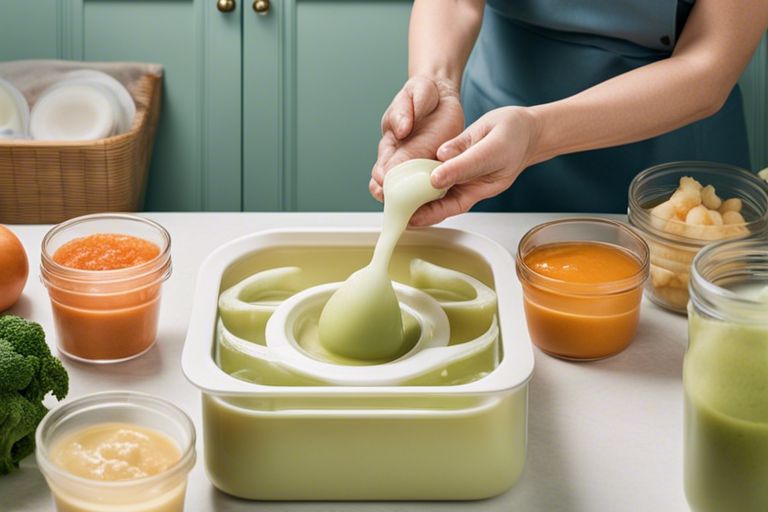tips, tricks and guides for parenthood
The process of preparing food for your little one can be both rewarding and daunting. Ensuring that your baby's meals are safe and nutritious is crucial for their healthy growth and development. Knowing the dos and don'ts of safe baby food preparation can help you navigate this important aspect of parenting with confidence. From choosing the right ingredients to maintaining proper hygiene throughout the cooking process, there are key guidelines to follow to protect your baby from potential hazards and provide them with wholesome meals. Let's explore some crucial tips to help you prepare safe and delicious food for your little one.
Choosing the right ingredients for your baby's food is vital. Opt for fresh, organic, and seasonal fruits and vegetables to ensure your baby gets the best nutrients. Avoid using any ingredients that may cause allergies in infants, such as nuts or honey.
Tips for cooking and pureeing baby food include steaming or boiling fruits and vegetables to retain nutrients, and using a blender or food processor to achieve the desired consistency. Ensure you cook all ingredients thoroughly and avoid adding any salt or sugar during the preparation process. This will help your baby develop a taste for natural flavours.
Food safety is paramount when preparing baby food. Always ensure that all utensils and surfaces are cleaned and sterilised before use. Additionally, store any leftover baby food in airtight containers in the fridge and use it within a day or two. This will help prevent any harmful bacteria from growing in the food.
For all parents, it is important to be aware of common food hazards when preparing meals for your little one. Avoid giving honey to babies under one year old due to the risk of botulism. Additionally, avoid offering small, hard foods that could be a choking hazard, such as raw carrots or whole nuts. Be cautious with foods that can cause allergies, like cow's milk, eggs, and shellfish.
Food preparation for babies requires careful attention to detail to avoid mistakes that could harm your baby. Never leave your baby unattended while eating to prevent choking hazards. Avoid preparing food in advance and leaving it at room temperature for extended periods, as bacteria can quickly multiply. Remember to always check the expiry dates on baby food products to ensure they are safe for consumption.
When considering your baby's safety, avoiding these common food hazards and mistakes is crucial. By staying informed and following safe food preparation practices, you can help keep your little one healthy and happy.

For Keeping your baby's food safe - MSU Extension, it is necessary to follow proper storing and reheating practices to ensure your baby's meals are safe.
With safe storage practices, it is important to refrigerate any unused portions of baby food promptly. Store homemade baby food in airtight containers in the fridge for up to three days. If freezing, use airtight containers or ice cube trays, labelling them with dates for easy tracking.
One necessary tip for reheating food is to ensure it is thoroughly heated to kill any harmful bacteria. Use a microwave or stovetop to reheat the food until it is piping hot, stirring well and allowing it to cool before serving. Avoid reheating food multiple times to reduce the risk of bacterial contamination.
Storing and reheating your baby's food properly is crucial for maintaining its safety and quality. By following these guidelines, you can ensure that your little one's meals are always fresh and free from any harmful bacteria.
Despite mastering the basics of safe baby food preparation, it's time to explore new flavours and textures to stimulate your baby's palate. Begin by introducing small amounts of new ingredients gradually to monitor any adverse reactions.
Basics of safe baby food preparation must also extend to being aware of potential allergies and food sensitivities. Certain foods like nuts, dairy, and shellfish can trigger severe reactions in some babies. Always be cautious and observant when introducing new ingredients.
For instance, it's crucial to introduce common allergens one at a time and observe any reactions such as rashes, vomiting, or diarrhoea. Consult with a healthcare professional if you suspect any food allergies or sensitivities in your baby.
Following this guide on the dos and don'ts of safe baby food preparation, you can ensure that you are providing your little one with nutritious and safe meals. Remember to always wash your hands and ingredients thoroughly, avoid certain foods that are choking hazards or allergenic, and follow proper storage and reheating techniques. By following these simple guidelines, you can create a safe and healthy feeding environment for your baby, setting them up for a lifetime of good eating habits and well-being.
A: When preparing baby food, DO wash your hands thoroughly, use fresh ingredients, and store food properly. DON'T add salt, sugar, honey, or any spices to your baby's food before their first birthday.
A: Yes, it is crucial to cook baby food thoroughly to kill any harmful bacteria. Make sure all meats are cooked through and fruits and vegetables are soft enough for your baby to eat.
A: Store homemade baby food in airtight containers in the fridge for up to 48 hours. You can also freeze baby food in ice cube trays for easy portioning and store it in the freezer for up to 3 months.
A: Yes, you can mix different types of baby food together, but make sure they are all safe and suitable for your baby's age. Avoid mixing foods that your baby hasn't tried individually yet to check for allergies.
A: Yes, there are some foods you should avoid giving to your baby, including honey, whole nuts, cow's milk, and foods high in salt, sugar, or additives. Always consult with your paediatrician before introducing new foods to your baby.